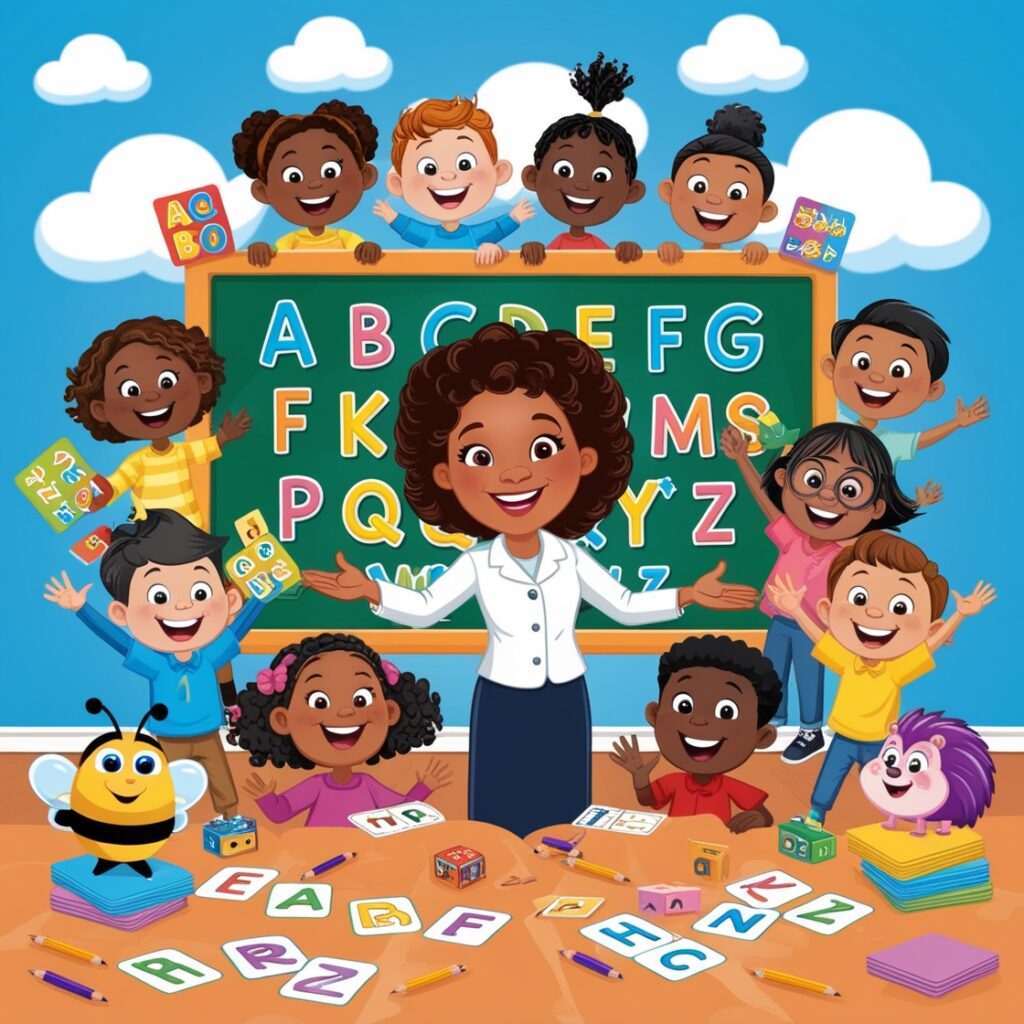What Are Phonics?
The concept of phonics is such exciting approach to the teaching of reading and writing English language. Think of it as a secret PIN to decode how letters in a word are uttered. Think of yourself as a reader who is a detective when it comes to decoding letters!
Why Phonics Matter
When you learn phonics, you get a powerful tool to:
- Read words more easily
- Understand how letters make sounds
- Spell words correctly
- Become a confident reader
The Building Blocks of Phonics
Alphabet Sounds
Each alphabet also has its own unique sound. Let’s explore how these sounds work:
Vowel Sounds
In the alphabets, vowels are A, E, I, O, and U. Well, they are so useful in reading!
Short Vowel Sounds:
- A sounds like “cat”
- E sounds like “bed”
- I sounds like “sit”
- O sounds like “hot”
- U sounds like “hut”
Long Vowel Sounds:
- A sounds like “cake”
- E sounds like “meet”
- I sounds like “kite”
- O sounds like “home”
- U sounds like “cute”
Consonant Sounds
Everything that is not a vowel is a consonant. Each has a unique sound:
- B makes a “buh” sound (ball, bat)
- C can sound like “kuh” or “sss” (cat, city)
- D makes a “duh” sound (dog, duck)

How Phonics Help You Read
Blending Sounds
A synthesis is a process of combining several sounds to give a word. Here’s how it works:
- Start with individual sounds
- Say each sound slowly
- Speed up the sounds
- The word appears like magic!
Examples:
- c-a-t → cat
- d-o-g → dog
- h-a-t → hat
Special Sound Patterns
Consonant Blends
Two or three consonants working together:
- st in “stop”
- bl in “blue”
- tr in “tree”
- cr in “crab”
Digraphs
Two letters making one sound:
- sh in “ship”
- ch in “cheese”
- th in “thumb”
- wh in “what”
Phonics Learning Strategies
Tips for Success
- Listen carefully to sounds
- Practice reading out loud
- Use your finger to point to words
- Don’t be afraid of making mistakes
- Ask for help when you need it
Learning Tools
- Phonics books
- Educational apps
- Alphabet charts
- Sound cards
- Reading games
Tricky Words
There are some irregular words that don’t read normally, phoenetically. We call these “sight words”:
- the
- was
- said
- where
- come
Fun Phonics Activities
Sound Matching Game
- Match picture cards to their beginning sounds
- Find objects around you that start with a specific sound
Word Building
- Use letter tiles to create new words
- Challenge yourself to make the most words possible
Sound Hunt
- Listen for specific sounds in conversations
- Play “I Spy” with sounds instead of colors
Phonics Facts
- English has 44 different sounds
- Some sounds can be made by different letter combinations
- Every language has its own phonics system
Frequently Asked Questions (FAQs)
Q: In how many lessons is it possible to introduce phonics to students?
A: Phonemic awareness is learned in different ways by different students. It has emerged that some children are fast learners whereas others are slow learners. The most important merely is that you play and enjoy yourselves!
Q: Is phonics important for all languages?
A: Phonics does not function in the same manner in all the languages. English has phonics used for reading, but other languages will not have the same methods as a country will have it’s own way of reading.
Q: Can I learn phonics at home?
A: Absolutely! Some ways you can get practise in phonics are by having parents or guardians read to you, asking your siblings to help and play phonics games and activities with you.
Q: There is an important question though, what if I have problems with phonics?
A: Don’t worry! Everyone learns differently. Continue reading, seek assistance where necessary, and always consider that the process becomes progressively more facile.
Q: At what age can someone begin learning phonics?
A: Most children read with phonics at the ages of 4-6 but it is never too early or too late to learn.
Q: Do all schools teach phonics?
A: Phonics are widely utilised in most schools as the primary teaching approach to reading, though approaches differ in application.
Conclusion: Your Reading Superpower
Phonics is a fantastic concept to learn because it gives one a superpower. You’re not just reading words; you’re unlocking entire worlds of stories, information, and imagination. Every sound that you learn is a step towards becoming a confident powerful reader.
Phonics Motto
“Sound by sound, word by word, reading becomes your greatest adventure!”
Bear in mind though that every great reader was once in your current position. Take your time, relax and bear with yourself, remember that reading is an art master which is enjoyable to learn.


